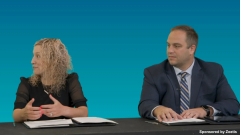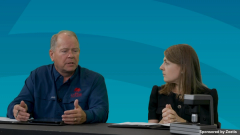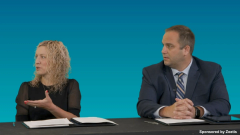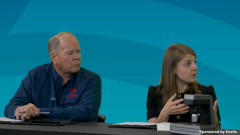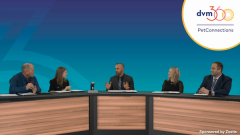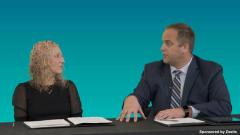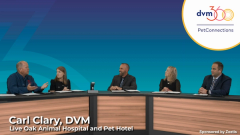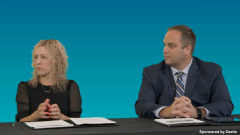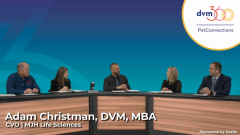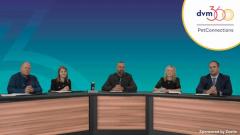
Zahara’s Story
A pet owner and veterinarian share their story of how they used Zoetis’ Vetscan Imagyst® and Virtual Laboratory to diagnose and treat a dog with lymphoma
Episodes in this series

Sponsored by Zoetis
Adam Christman, DVM, MBA
Joining us today is Dr. Wolfe's client and patient Lisa Bono and Zahara. How are you, Lisa?
Lisa Bono
I'm good. Thank you. How are you? Good.
Adam Christman, DVM, MBA
Do you have a little video of your fur baby there somewhere? I understand Zahara's there somewhere?
Here she is. Here's Zahara in all of her glory.
Adam Christman, DVM, MBA
So good to see you. So, tell us about Zahara. And what has your experience been with Zahara and her care through the years with Dr. Wolfe.
Lisa Bono
Actually, Dr. Wolfe and I started working together just earlier this spring afterZahara’s diagnosis with lymphoma. I had been going to see other vets at her clinic. But then when she got the diagnosis, I was referred over to Dr. Wolfe. So, we've had about half a year of knowing each other. Dr. Wolfe has been amazing. I've always felt like she's been...has Zahara's best interest at heart, and I felt very confident in the care that she's provided for Zahara.
Adam Christman, DVM, MBA
Oh, I love that. So, tell us about her recent health issue that was uncovered.
Lisa Bono
So, Zahara was, as I mentioned, diagnosed with lymphoma earlier this year, and went to talk to Dr. Wolfe and we began a CHOP protocol for her. She was doing quite well for some time until we hit the doxorubicin in the first round of the CHOP protocol. And she just hit a wall pretty fast with that. Within a few days she had severe, severe diarrhea. This is a Basenji, so she doesn't really drool, and she was just copious drool and fluid from all orifices, shall we say. And brought her into Dr. Wolfe. And she spent some time with her there. And we had to then figure out what was going on for her. And I'm sure Dr. Wolfe can go through some more the details of exactly what we had to do. But basically, we had to figure out what was the problem? Was it liver failure? Was it severe GI distress. And what we were able to do was figure out that it was GI distress, but it was a series of different tests that we had to do to try to narrow it down. And it was quite dire at that time. So, figuring out what we needed to do quickly was a challenge.
Adam Christman, DVM, MBA
Sure. And it sounded like diagnostics and urgency were really important at this time. So how important were those diagnostic tests that resulted that turnaround time for you and Zahara?
Lisa Bono
So I should just give you a little bit of background for myself. I'm actually a professor of biology here at Texas Tech University. So, I do research for a living. I really like data, right? And the ability to have these rapid diagnostics, right, every day, Dr. Wolfe would call me up, we'd have like, a long conversation on the phone and literally go through all of her numbers. So, Dr. Wolfe had to teach me a little bit about what diagnostics we had access to. But then we could go through all of the data for her day by day and compare it to the previous day, so that we could see where things were going with her. And that allowed us to make evidence-based decisions in a very emotionally fraught situation. So, we could make a call very quickly about are we going to continue with this approach or another approach or do other types of tests?
Adam Christman, DVM, MBA
I love this. It sounds like it was so collaborative together.
Lisa Bono
It was absolutely collaborative. I really appreciated it.
Adam Christman, DVM, MBA
Yeah. So having those diagnostic tests made available quickly seemed very helpful for both of you and for Zahara so you can come together for the greater good of our treatment plan it sounds like.
Shelli Wolfe, DVM, MBA
Yes, as she mentioned, we did those diagnostic tests daily. And there was a there was a moment a few days into her hospitalization that we were deciding together if we were going to move forward with her care, or if if what would be more appropriate to stop treatment. And it was having those diagnostics rapidly available that helped me determine that this was GI distress and not some other type of chemotherapy complication.
Adam Christman, DVM, MBA
Absolutely. And how's Zahara doing?
Lisa Bono
She's doing quite well. She brings me toys in the evening. She wants to play with that. She goes with us to our local breweries and likes to hang out with people and dog watch with that. And absolutely, without these diagnostics at that moment, I do not think that she'd be with us here today. And we're actually getting ready to celebrate her 11th birthday in a few weeks. Honestly, when I got this diagnosis, I really wasn't sure that we were going to see her 11th birthday, so I'm pretty excited right now.
Adam Christman, DVM, MBA
Oh, that's wonderful, happy early birthday to her. What would you like other pet parents to know about your experience with Dr. Wolfe and how she uses that as diagnostics.
Lisa Bono
So one thing that was really helpful for me is that we live in West Texas and what may not be obvious to many of your viewers is that this is a fairly remote part of the country. I grew up in New Jersey, and in the northeast, so I was used to, you know, you go to your vet, and if you need to go see a specialist, you can go down the road. And within an hour or less, you can get to see somebody that will know how to handle these situations. But here in West Texas, Lubbock is the largest thing in any direction for five and a half hours. So, if I needed to go see somebody, see a specialist, we would have to actually drive five and a half hours, right. And that would be really limit the type of care that we could have gotten for Zahara, and to have all these things in house and so fast. I mean, like, you know, again, I love fast data, right? So, we could get these results for her within very short periods of time and make these decisions rather than me having to drive five and a half hours and go see somebody for some of this type of equipment, as we would have, you know, back in the day before this kind of equipment was available. So, it really made it you know, accessible, rather than being cost prohibitive and time prohibitive to do these things.
Newsletter
From exam room tips to practice management insights, get trusted veterinary news delivered straight to your inbox—subscribe to dvm360.

